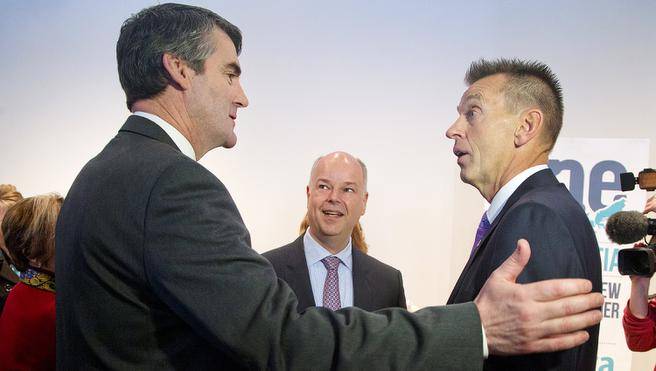This editorial was written by Mark Coffin, and originally featured in The Chronicle Herald, Opinions section. See the original here.
“A new politics” was the first of the 12 game-changing strategies that the Ivany commission recommended in its report to Nova Scotians over a year ago.
As the commission noted, “It is difficult to imagine how … longer-term initiatives can be successfully implemented across two or more elections and possible changes in government and party leaders if we maintain ‘politics as usual’.”
New solutions can’t happen with old politics.
Yet, in the work plan of the government-led response to Ivany, the One Nova Scotia coalition, “a new politics” isn’t even referenced as a goal.
Premier Stephen McNeil met the current legislature in November 2013. Their first order of business was to have his Throne Speech read for MLAs. The first piece of substance in the speech bemoaned the low voter turnout from the election that brought him to power, and made a clear commitment to do something about it.
“Steps will be taken to address this erosion in voter participation,” the speech read. “These steps will be based on engaging with Nova Scotians in a discussion about our electoral process.”
That hasn’t happened either, and sources within the public service tell me that it won’t.
This much is clear: if Nova Scotians want a new politics, it will be up to Nova Scotians to create it.
Last year, the organization I run, Springtide, launched the Make Democracy Better project with three goals in mind.
First: to find people who like the idea of democracy but think it can be done better. Second: to get those people talking to one another — in their own communities, and across the province. Finally: to build an action plan for a better democracy, using the priorities identified by participants and inspired by the best information and research available.
We’ve visited communities from Shelburne to Sydney to host community dialogues. Now, we’re inviting Nova Scotians to contribute to the project online at MakeDemocracyBetter.ca. This is done through the online platform, Ethelo, a tool that enables large groups to make decisions together.
Through the platform, project participants are asked to choose from a number of specific proposals that could make democracy better. Collectively, participants are to be responsible for shaping which of those proposals are selected for deeper deliberative discussion across Nova Scotia.
In the community events we hosted in the fall and winter, some participants challenged us to focus less on improving politics, and more on encouraging participation, particularly among youth.
We do some of that at Springtide, but my hesitation to make it a greater priority was expressed well by a friend who teaches an introductory course in politics at Dalhousie University.
“The biggest challenge I face is that it’s my job for students to leave my classroom knowing more about politics than when they came in,” she told me. “The problem is, I can’t do my job without making them more cynical about the whole system by the time I’m finished.”
John Dewey, the American philosopher who frequently summered in Hubbards, spent a great deal of thought, time and typewriter ink exploring the relationship between democracy and education.
“Democracy has to be born anew every generation,” he wrote. “And education is its midwife.”
Ultimately, the Make Democracy Better project is about inviting Nova Scotians to join their neighbours and friends, strangers and adversaries to learn, explore and debate how changes to our democratic system can lead to a new kind of politics, one that gives us more reasons to step up and get engaged than reasons to stay home. A new politics, where we judge ideas, not by where they came from but by where they can take us. We want to help build a Nova Scotia where the citizenry is active — where our democracy isn’t just something we have, but something we do.
There is no shortage of social, economic and environmental problems facing Nova Scotia now and in the coming years. Albert Einstein famously said, “you can’t solve problems with the same level of thinking that created them.”
Similarly, we can’t expect our political system and culture to resolve the problems that they have allowed to grow and fester for so long. A new politics isn’t going to come from government, so it’s up to Nova Scotians to do it. We invite all Nova Scotians to join the conversation at MakeDemocracyBetter.ca.





